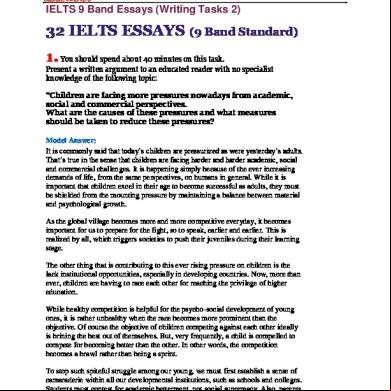Ielts Writing Band 9 4j4b57
This document was ed by and they confirmed that they have the permission to share it. If you are author or own the copyright of this book, please report to us by using this report form. Report 3b7i
Overview 3e4r5l
& View Ielts Writing Band 9 as PDF for free.
More details w3441
- Words: 1,583
- Pages: 5
Topic 1: The number of plants and animals is declining. Describe some reasons for this problem and suggest some solutions. Essay: It is undeniable that wildlife habitats are being destroyed and whole species of plants and animals are disappearing. There are several causes of this alarming trend, but measures could certainly be taken to tackle the problem. Some human activities are the culprit of the global decline in the number of plants and animals. Firstly, millions of hectares of trees are being uprooted to give space for farmland, leading to an excessive loss of the natural habitat of many wildlife species. Secondly, industrial and domestic pollution are primary ways in which humans have caused drastic modifications of the environment. For instance, some animal species such as the bald eagle, peregrine falcon, and brown pelican have suffered severely due to a synthetic chemical called DDT that destroys their reproductive systems. Finally, gas emissions from factories and exhaust fumes from vehicles lead to global warming, which may have a devastating effect on wildlife species in the future. There are several actions that governments and individuals could take to solve the problems described above. The first simple solution would be for governments to create regulations restricting cultivable land, thereby decreasing the rate of deforestation. They could also introduce laws to limit emissions from factories or to force companies to use renewable energy from solar, wind, or water power. Imposing “green taxes” on drivers and airlines is another way to encourage people to use public transport and to take fewer flights abroad, therefore reducing emissions. Individuals could contribute to reversing the situation by choosing products with less packaging and recycling as much as possible. In conclusion, a number of reasons for the decline of millions of plants and animals can be addressed, and various measures can be taken to resolve this problem.
(288 words, band 9) written by Mr. Hiep ([email protected])
Topic 2: Few languages are increasingly spoken in different countries, while the usage of others is rapidly declining. Is this a positive or a negative development? Essay: In the era of globalization, a lot of barriers have been pulled down, giving a bright prospect for a few major languages such as Arabic, Chinese, Spanish, and especially English, simultaneously, pushing some others to the verge of extinction. In my view there are both positive and negative effects. One the one hand, these developments can be extremely positive. Firstly, cooperation and interactions between people in different countries will become much easier when they start using one major language as a lingua franca or bridge language to communicate worldwide. For example, thanks to the prevalence of English, which is the most commonly learned foreign language, millions of Vietnamese people now can use this language to not only conduct corporate communications and commerce with foreigners locally and internationally but also enhance their cross-cultural understanding. Secondly, some countries will become globally competitive either in business or in the labor market because they know how to understand and utilize the dominant international languages. On the other hand, the dwindling usage or even extinction of many minor languages causes many unfortunate consequences. For instance, if two thirds of a country’s inhabitants abandon their mother tongue in favor of a second language, the loss of cultural identity of that country is inevitable because culture forms language, and language revolves around culture, so the demise of one means the same for the other. The extinction of some inferior languages will also bring about the destruction of cultural diversity, and in return, the obsolescence [good word!] of many cultural studies. In conclusion, the dramatic increases in popularity of many primary languages with the fast diminution of many other minor languages have brought human beings both benefits and drawbacks.
(281 words, band 9) written by Mr. Hiep ([email protected])
Topic 3: Many parents go and work in other countries these days, taking their families with them. Do the advantages for families of development outweigh the disadvantages? Essay: In the era of globalization many adults tend to work abroad, bringing their spouse and children with them. While I accept that this trend can sometimes have a harmful impact on the travellers, I believe that it is more likely to have a positive effect. On the one hand, working overseas can be stressful for a number of reasons. Firstly, it can be a hassle to go through the paperwork of moving to another country. The more family you have, the more time, money, and effort you need to spend on completing the required legal procedures. For example, in order for a foreigner to bring all his family to live in the United States, he needs to spend two years and thousands of dollars applying for a green card and completing tons of paperwork. Secondly, time and money spent on moving your belongings might be significant because not every company offers to pay for relocation. Finally, it will be harder for your family to adjust to new schools or find a new job, in other words, to start a new life from scratch, taking into consideration the fact that you have to face cultural differences and language barriers. However, I would argue that these drawbacks are outweighed by the benefits. Depending on a person’s industry, there might be more career prospects in foreign cities, meaning that he is more likely to get hired and that it is quicker for him to climb up the career ladder. Furthermore, moving overseas can bring him ample opportunities not only to learn a second language firsthand but also to meet new people and foster his crosscultural understanding. Lastly, companies often offer management positions and great incentives to employees who are willing to move overseas, such as free housing or annual bonuses. In conclusion, it seems to me that the possible benefits of working abroad are more significant than the potential impediments.
(319 words, band 9)
Topic 4: Some people think that work is the most important part of people’s life. Without the success of career, life will become meaningless. To what extent do you agree or disagree? Essay: Some people hold a belief that a fruitful career is an indispensable part of people’s lives and their lives only make sense when they have it. I completely disagree with this view. A successful career is not the only factor that makes people’s lives meaningful. health and relationships are two no less important elements that people often strive for in order to have a fulfilling life. Furthermore, many people still enjoy a meaningful life without having an outstanding career. For example, my grandfather led a happy life as an ordinary mechanic worker before he ed away. It is because what he wanted to pursue in life was not money or fame but the sense of satisfaction when he had somebody to love, to share his life with, and to take care of. At the same time, I believe that people perceive things differently when they age. It is true that at twenty four, a young adult might consider having a successful career the most important thing in life, but at fifty his life priorities might change to something different. For instance, my mother used to consider her career as an ant the most important thing in her life when she was young, but now she has shifted her priorities to having a good health and a long-lasting relationship with my father. She is now retired and leads a happy life with my family. In conclusion, I believe that many different factors make life a worthwhile one, and having a fulfilling career is just one of them.
(256 words, band 9)
written by Mr. Hiep ([email protected])
Topic 5: Some people think all lawbreakers should be put into prison, while others believe that there are better alternatives. Discuss both views and give your opinion. Essay: People have different views about how to deal with lawbreakers. While some people agree with the idea of putting all lawbreakers in jail, I believe that there should be better substitutes. Putting all law offenders into prison is attractive for several reasons. Firstly, prison plays an important role in crime prevention and is expected to deter potential offenders through fear of punishment. For example, prisoners are often taught how to abide laws, and many of them become good citizens after released. Secondly, prison can be an effective way to achieve equality and ensure safety in society since all law offenders of the same degree, despite their race, skin color, culture, and wealth, are subject to the same sentence and put into the same place in prison. However, I think there should be other ways to deal with lawbreakers. The first reason is that sending them all to jail is a waste of taxpayers’ money. Repeated crime is one of the most vivid examples of how money is wasted. Furthermore, it is not fair that shoplifters, pocket pickers and murderers are all put in the same place for punishment. Juvenile delinquency, therefore, should have its own legal system that prescribes specific procedures for dealing with youth, such as juvenile detention centers, rehabilitation centers, and courts. Lastly, in the case of serious criminals, such as serial killers or people who commit massacres, a better option is the death penalty. In conclusion, while there are good reasons why all law offenders should be put in prison, in my opinion governments should apply different methods in dealing with various types of criminals.
(268 words, band 9)
(288 words, band 9) written by Mr. Hiep ([email protected])
Topic 2: Few languages are increasingly spoken in different countries, while the usage of others is rapidly declining. Is this a positive or a negative development? Essay: In the era of globalization, a lot of barriers have been pulled down, giving a bright prospect for a few major languages such as Arabic, Chinese, Spanish, and especially English, simultaneously, pushing some others to the verge of extinction. In my view there are both positive and negative effects. One the one hand, these developments can be extremely positive. Firstly, cooperation and interactions between people in different countries will become much easier when they start using one major language as a lingua franca or bridge language to communicate worldwide. For example, thanks to the prevalence of English, which is the most commonly learned foreign language, millions of Vietnamese people now can use this language to not only conduct corporate communications and commerce with foreigners locally and internationally but also enhance their cross-cultural understanding. Secondly, some countries will become globally competitive either in business or in the labor market because they know how to understand and utilize the dominant international languages. On the other hand, the dwindling usage or even extinction of many minor languages causes many unfortunate consequences. For instance, if two thirds of a country’s inhabitants abandon their mother tongue in favor of a second language, the loss of cultural identity of that country is inevitable because culture forms language, and language revolves around culture, so the demise of one means the same for the other. The extinction of some inferior languages will also bring about the destruction of cultural diversity, and in return, the obsolescence [good word!] of many cultural studies. In conclusion, the dramatic increases in popularity of many primary languages with the fast diminution of many other minor languages have brought human beings both benefits and drawbacks.
(281 words, band 9) written by Mr. Hiep ([email protected])
Topic 3: Many parents go and work in other countries these days, taking their families with them. Do the advantages for families of development outweigh the disadvantages? Essay: In the era of globalization many adults tend to work abroad, bringing their spouse and children with them. While I accept that this trend can sometimes have a harmful impact on the travellers, I believe that it is more likely to have a positive effect. On the one hand, working overseas can be stressful for a number of reasons. Firstly, it can be a hassle to go through the paperwork of moving to another country. The more family you have, the more time, money, and effort you need to spend on completing the required legal procedures. For example, in order for a foreigner to bring all his family to live in the United States, he needs to spend two years and thousands of dollars applying for a green card and completing tons of paperwork. Secondly, time and money spent on moving your belongings might be significant because not every company offers to pay for relocation. Finally, it will be harder for your family to adjust to new schools or find a new job, in other words, to start a new life from scratch, taking into consideration the fact that you have to face cultural differences and language barriers. However, I would argue that these drawbacks are outweighed by the benefits. Depending on a person’s industry, there might be more career prospects in foreign cities, meaning that he is more likely to get hired and that it is quicker for him to climb up the career ladder. Furthermore, moving overseas can bring him ample opportunities not only to learn a second language firsthand but also to meet new people and foster his crosscultural understanding. Lastly, companies often offer management positions and great incentives to employees who are willing to move overseas, such as free housing or annual bonuses. In conclusion, it seems to me that the possible benefits of working abroad are more significant than the potential impediments.
(319 words, band 9)
Topic 4: Some people think that work is the most important part of people’s life. Without the success of career, life will become meaningless. To what extent do you agree or disagree? Essay: Some people hold a belief that a fruitful career is an indispensable part of people’s lives and their lives only make sense when they have it. I completely disagree with this view. A successful career is not the only factor that makes people’s lives meaningful. health and relationships are two no less important elements that people often strive for in order to have a fulfilling life. Furthermore, many people still enjoy a meaningful life without having an outstanding career. For example, my grandfather led a happy life as an ordinary mechanic worker before he ed away. It is because what he wanted to pursue in life was not money or fame but the sense of satisfaction when he had somebody to love, to share his life with, and to take care of. At the same time, I believe that people perceive things differently when they age. It is true that at twenty four, a young adult might consider having a successful career the most important thing in life, but at fifty his life priorities might change to something different. For instance, my mother used to consider her career as an ant the most important thing in her life when she was young, but now she has shifted her priorities to having a good health and a long-lasting relationship with my father. She is now retired and leads a happy life with my family. In conclusion, I believe that many different factors make life a worthwhile one, and having a fulfilling career is just one of them.
(256 words, band 9)
written by Mr. Hiep ([email protected])
Topic 5: Some people think all lawbreakers should be put into prison, while others believe that there are better alternatives. Discuss both views and give your opinion. Essay: People have different views about how to deal with lawbreakers. While some people agree with the idea of putting all lawbreakers in jail, I believe that there should be better substitutes. Putting all law offenders into prison is attractive for several reasons. Firstly, prison plays an important role in crime prevention and is expected to deter potential offenders through fear of punishment. For example, prisoners are often taught how to abide laws, and many of them become good citizens after released. Secondly, prison can be an effective way to achieve equality and ensure safety in society since all law offenders of the same degree, despite their race, skin color, culture, and wealth, are subject to the same sentence and put into the same place in prison. However, I think there should be other ways to deal with lawbreakers. The first reason is that sending them all to jail is a waste of taxpayers’ money. Repeated crime is one of the most vivid examples of how money is wasted. Furthermore, it is not fair that shoplifters, pocket pickers and murderers are all put in the same place for punishment. Juvenile delinquency, therefore, should have its own legal system that prescribes specific procedures for dealing with youth, such as juvenile detention centers, rehabilitation centers, and courts. Lastly, in the case of serious criminals, such as serial killers or people who commit massacres, a better option is the death penalty. In conclusion, while there are good reasons why all law offenders should be put in prison, in my opinion governments should apply different methods in dealing with various types of criminals.
(268 words, band 9)










